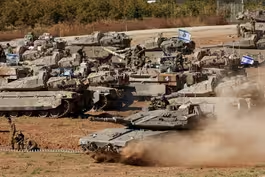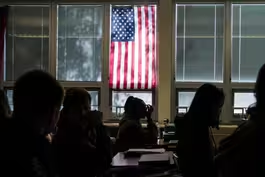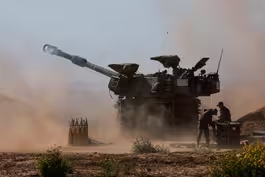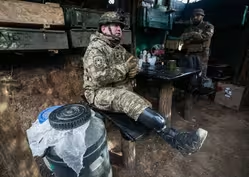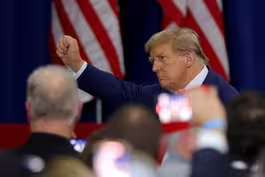
College students on divisions over Israel and free speech
Clip: 5/8/2024 | 12m 19sVideo has Closed Captions
College students on divisions over Israel, safety and what is considered free speech
The debate around how colleges are handling protests played out in Washington D.C. Wednesday as police cleared out encampments at George Washington University. This week, we visited that encampment and others to hear why students are protesting and explore a long-standing divide over the rhetoric and language used to describe the Israel-Palestinian conflict. Stephanie Sy reports.
Problems playing video? | Closed Captioning Feedback
Problems playing video? | Closed Captioning Feedback
Major corporate funding for the PBS News Hour is provided by BDO, BNSF, Consumer Cellular, American Cruise Lines, and Raymond James. Funding for the PBS NewsHour Weekend is provided by...

College students on divisions over Israel and free speech
Clip: 5/8/2024 | 12m 19sVideo has Closed Captions
The debate around how colleges are handling protests played out in Washington D.C. Wednesday as police cleared out encampments at George Washington University. This week, we visited that encampment and others to hear why students are protesting and explore a long-standing divide over the rhetoric and language used to describe the Israel-Palestinian conflict. Stephanie Sy reports.
Problems playing video? | Closed Captioning Feedback
How to Watch PBS News Hour
PBS News Hour is available to stream on pbs.org and the free PBS App, available on iPhone, Apple TV, Android TV, Android smartphones, Amazon Fire TV, Amazon Fire Tablet, Roku, Samsung Smart TV, and Vizio.
Providing Support for PBS.org
Learn Moreabout PBS online sponsorshipAMNA NAWAZ: The ongoing debate around how colleges and cities are handling pro-Palestinian protests played out here in Washington, D.C., today.
Early this morning, hours before Mayor Muriel Bowser was set to testify on Capitol Hill about this, police used pepper spray to clear encampments and crowds at George Washington University.
Nearly three dozen people were arrested.
The hearing was later canceled.
Over the last week, "NewsHour" producers visited that campus and others across the country, talking to students about why they're protesting, about the language being used and the limits of free speech.
Stephanie Sy has our report.
(CHANTING) STEPHANIE SY: For nearly two weeks on George Washington University's campus, more than 100 tents stretched across the lawn, part of a demonstration by students from around the D.C. area.
SELINA AL-SHIHABI, Georgetown University Student: Gaza, that's why were here.
That's why were doing what were doing.
And I think a lot of students, I mean, after October 7, have been just feeling this frustration, and they have been feeling kind of this disgust with the world around them.
STEPHANIE SY: Twenty-year-old Palestinian-American sophomore Selina Al-Shihabi says she has lost family members in the conflict.
She's here because of the high death toll in Gaza, now at more than 34,000, according to the Gaza Health Ministry, and U.S. military support for Israel.
SELINA AL-SHIHABI: A lot of us, we have been taught that the freedom of speech, the right to life, the right to liberty, the right to pursuit of happiness, that water, food, are basic rights, that everyone should have.
And, like, seeing the United States endorse this is just actually outrageous.
PROTESTER: Free, free Palestine!
STEPHANIE SY: But the rhetoric that has surrounded the protests has made some students fearful.
Sabrina Soffer and Skyler Sieradzky are seniors at George Washington and are both Jewish.
SABRINA SOFFER, George Washington University Student: Over the past week or so, and since this whole war even started, and since October 7, even the day after, I felt that, as a Jewish student, I have felt unwelcome in my classes and on this campus.
STEPHANIE SY: Even before the October 7 terror attacks, antisemitic incidents in the U.S. were on the rise, increasing by more than 35 percent in 2022 alone.
SKYLER SIERADZKY, George Washington University Student: My parents are extremely concerned for my safety and well-being.
My mom was asking me if I could put go on the campus as little as possible.
Don't go near the encampment.
STEPHANIE SY: Sabrina is Israeli-American, and most of Skyler's extended family lives in Israel.
SKYLER SIERADZKY: And without Israel, my family would have been a part of the six million that we have lost -- that we lost during the Holocaust.
Without Israel, it means that I wouldn't be here today, that my peers wouldn't be here today.
STEPHANIE SY: And they say the signs they see around campus go far beyond protesting a war or the policies of Israel's Prime Minister Benjamin Netanyahu, known as Bibi.
SKYLER SIERADZKY: I think you can absolutely critique Israel's politics.
You can critique Bibi and his government, as I do with my friends and my family.
And that's not antisemitic.
It becomes antisemitic when you start criticizing the state of Israel's existence.
SABRINA SOFFER: The sentiment that anti-Zionism is not antisemitism is far detached from reality, and it is these so-called moral high ground causes that are far removed from the history of the Jewish people.
STEPHANIE SY: Zionism, genocide, "From the river to the sea,' these are among the terms fueling the conflict over the conflict playing out across the country and most visibly on college campuses.
PROTESTER: How many kids did you kill today?
PROTESTERS: How many kids did you kill today?
KENNETH STERN, Director, Bard Center for the Study of Hate: Each is in a political moment.
Each feels somewhat threatened.
And each is staking out a maximalist position.
STEPHANIE SY: These differing viewpoints, though not new, have only intensified in the aftermath of Hamas' October 7 terror attacks and Israel's military response, says Kenneth Stern, the director of the Bard Center for the Study of Hate.
KENNETH STERN: This is such a fraught subject where there are two sort of national identity stories that are in direct conflict with each other, and people subscribe to one or the other, and really don't see the nuance.
STEPHANIE SY: Many protesters across the country say they are simply protesting an ideology.
OMAR ALY, University of Minnesota Student: Our fight has been against Zionism, has been against an Israeli government.
It has never been against a religion.
STEPHANIE SY: University of Minnesota senior Omar Aly was at his schools encampment last week.
OMAR ALY: We are calling for a free Palestine, so it's free of settlers, not free of one religion or the other.
We want Palestinian Muslims, Palestinian Christians, Palestinian Jews to live in one place.
PROTESTERS: No justice, no peace!
STEPHANIE SY: At George Washington University, Jewish student Miriam is also anti-Zionist.
She asked us not to use her last name, for fear of retribution.
MIRIAM, George Washington University Student: I know that my Jewish identity for me is -- has no ties to a nation-state.
That's not something that I feel is important to me, especially a nation-state that has been occupying Palestinian land for 76 years.
So I think decolonizing sort of the Jewish identity means separating Zionism from Judaism and therefore separating anti-Zionism from antisemitism.
STEPHANIE SY: But, to many Jews, anti-Zionist sentiments are a direct threat to the existence of a Jewish state and are intrinsically antisemitic and threatening.
Ethan Fine IS a Jewish senior at the University of Minnesota.
ETHAN FINE, University of Minnesota Student: When you seek to preserve the right to self-determination for everybody except for the Jewish people, that is antisemitic, that is anti-Jewish rhetoric,and that is where antisemitism and anti-Zionism become very close.
STEPHANIE SY: At colleges across the country, one phrase in particular is a lightning rod.
Pro-Palestinian protesters have been chanting this.
PROTESTER: From the river to the sea!
PROTESTERS: From the river to the sea!
PROTESTER: Palestine will be free!
STEPHANIE SY: The refrain reflects deeply held beliefs over who should control the land between the Jordan River and the Mediterranean Sea, where the nation of Israel and the occupied-Palestinian territories sit.
SELINA AL-SHIHABI: What we are calling for is a one-state solution where Israelis and Palestinians and Jews and Muslims can live in coexistence.
STEPHANIE SY: In 1977, Israeli Prime Minister Netanyahu's own party used the same phrase in its original platform.
And, today, he says Israel should have security control over the entire area.
SELINA AL-SHIHABI: It's ironic that a lot of Israeli critics claim that that's problematic.
They call for a Jewish state from the river to the sea.
And so that is -- that's just extremely contradictory.
STEPHANIE SY: Hamas, which has called for the destruction of Israel, added the phrase "From the river to the sea" to its charter in 2017.
And pro-Israel groups, including the Anti-Defamation League, have labeled the phrase antisemitic.
ETHAN KATZ, Co-Director, Berkeley Anti-Semitism Education Initiative: Slogans like there is only one solution, intifada revolution, slogans like "From the river to the sea, Palestine will all be free" are inevitably heard as endorsements of violence because the most prominent act of so-called resistance being valorized in many of the same rallies was explicitly, at least for some of the leadership of Hamas and some of the perpetrators, about murdering Israeli Jews.
STEPHANIE SY: Ethan Katz, a historian at the University of California at Berkeley, acknowledges the diverse meanings of the phrase, but says it has particular charge after the October 7 terror attack on Israel, when Hamas killed some 1,200 people.
Some pro-Israel supporters say any endorsement of resistance against Israel is an implicit support for Hamas.
None of the pro-Palestinian students "NewsHour" interviewed expressed support for Hamas' actions on October 7, but some student groups have lauded the attack.
ETHAN KATZ: We know the horrific details.
We know what a brutal attack this was, and huge parts of it on civilians in horrific ways, while being described as an act of resistance, as an act of liberation, both by its perpetrators and by many activists.
SKYLER SIERADZKY: The rhetoric being used at these protests is not that of a peaceful conclusion to this war.
It's that of violence.
MAHA NASSAR, University of Arizona: I think it is important to keep in mind that the protest is against a system of oppression and not against a group of people.
And we have to be very clear about the importance of keeping those things separate.
STEPHANIE SY: Maha Nassar is a historian at the University of Arizona.
MAHA NASSAR: For the vast majority of the protesters who are using this chant, it is a call for freedom for everyone who lives between the river and the sea.
STEPHANIE SY: Ezra Kaye, a Jewish student at Case Western Reserve University in Cleveland, says how words are spoken matters.
EZRA KAYE, Case Western Reserve University Student: Saying things like the classic "From the river to the sea" get construed as antisemitic.
It all comes down to the context of what's happening, who's doing it, and at what time.
STEPHANIE SY: Another fiercely contested term is genocide.
Some, like Samantha Ginsberg, a Jewish senior at the Ohio State University, say Israel's actions in Gaza don't meet the threshold for the charge.
SAMANTHA GINSBERG, The Ohio State University Student: Genocide is a really serious accusation, and it does not deserve to be watered down and simplified and just applied to everything.
That's a genocide.
It's not.
It requires intent.
There is no intent to wipe out the Palestinian people.
STEPHANIE SY: According to a January YouGov/Economist poll, 49 percent of young adults under the age of 30 do believe Israel is committing a genocide.
EZRA KAYE: Even though no one has been convicted with genocide yet, it's starting to look and feel a lot like genocide.
So whether you want to call it or not, we can see that something is happening that looks and feels a lot like it.
KENNETH STERN: The ability to navigate both of those narratives simultaneously is really what's at the heart of this and the difficulty of many students, because they pick one and, you know, they ignore the other, when really both should be engaged.
STEPHANIE SY: As each side becomes more entrenched, Stern from the Bard Center for the Study of Hate says some university officials are struggling with how to navigate this conflict.
KENNETH STERN: The obligation on campus is to keep students safe physically and from harassment and from true threats, but not safe from ideas.
Students should not expect that they're not going to hear things that are disturbing.
They should be expecting to have scholars and administrators and others help them unpack that and learn from it.
And they should have the intellectual curiosity to figure out why somebody has a different point of view.
STEPHANIE SY: In order to move forward, he says students should focus on areas of common understanding.
KENNETH STERN: Where can you agree?
You can agree what we're seeing is awful, whether you want to technically call it genocide or not, where can we agree on things?
And underscoring that, I think, is a way forward for students.
PROTESTER: Palestine will be free!
PROTESTERS: Palestine will be free!
STEPHANIE SY: It's unclear whether students can reconcile the warring narratives, as protests continue on campuses from coast to coast.
For the "PBS NewsHour," I'm Stephanie Sy.
Biden administration defends suspending weapons to Israel
Video has Closed Captions
Clip: 5/8/2024 | 4m 15s | Biden administration defends suspending weapons to Israel over Rafah assault concerns (4m 15s)
Congress grills school leaders over antisemitic incidents
Video has Closed Captions
Clip: 5/8/2024 | 5m 10s | Congress grills district leaders on rise in antisemitic incidents at high schools (5m 10s)
Democratic, GOP lawmakers react to hold on weapons to Israel
Video has Closed Captions
Clip: 5/8/2024 | 11m 19s | Democratic, GOP lawmakers react to Biden pausing bomb shipment to Israel (11m 19s)
Ukrainian troops who lost limbs receive prosthetics and hope
Video has Closed Captions
Clip: 5/8/2024 | 7m 1s | Ukrainian troops who lost limbs in war receive prosthetics and hope for the future (7m 1s)
Where Trump's classified documents case stands after delay
Video has Closed Captions
Clip: 5/8/2024 | 6m 34s | Where Trump's classified documents case stands after judge indefinitely postponed start (6m 34s)
Providing Support for PBS.org
Learn Moreabout PBS online sponsorship
- News and Public Affairs

FRONTLINE is investigative journalism that questions, explains and changes our world.

- News and Public Affairs

Amanpour and Company features conversations with leaders and decision makers.












Support for PBS provided by:
Major corporate funding for the PBS News Hour is provided by BDO, BNSF, Consumer Cellular, American Cruise Lines, and Raymond James. Funding for the PBS NewsHour Weekend is provided by...
